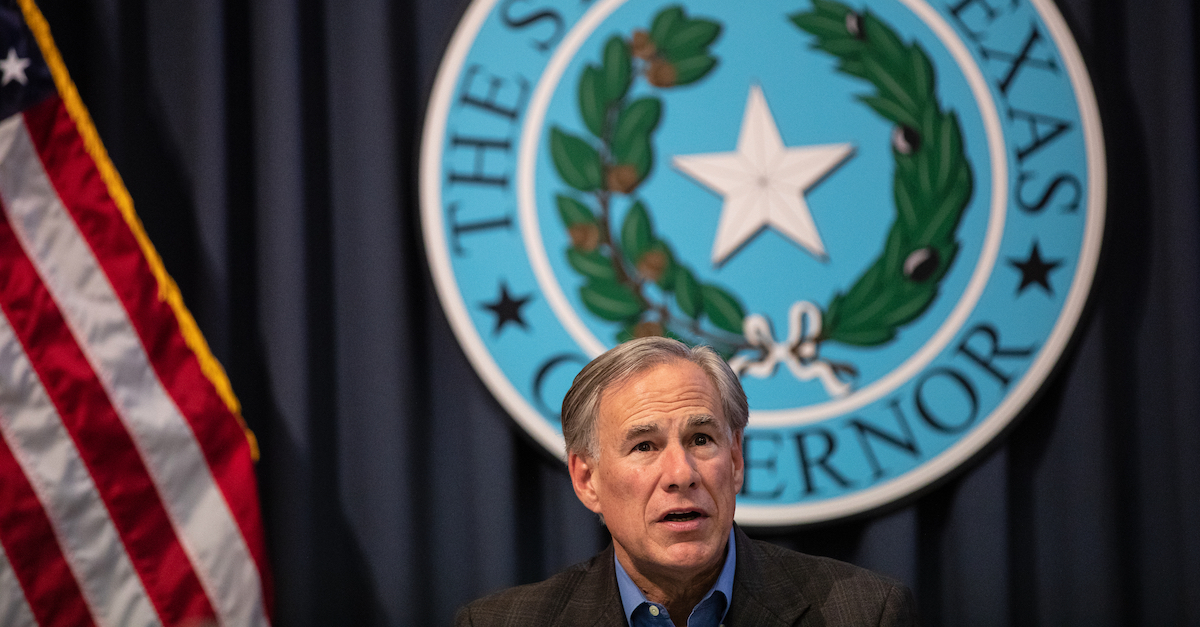
Texas Gov. Greg Abbott speaks during a briefing on July 10, 2021, in Austin.
The Texas Supreme Court has lifted the statewide application of an injunction which banned the enforcement of Gov. Greg Abbott’s (R) directive that regards medical care for transgender children as potentially abuse.
“We also conditionally grant relief with respect to the order’s injunction against the Governor, as there is no allegation that he is taking, or has authority to take, the enforcement actions the order enjoins,” the decision states.
The court, however, left an order in place shielding the two parents, their child, and health care provider who filed a lawsuit against Abbott and other officials in March. The parents and their transgender daughter sued anonymously, together with Houston-based clinical psychologist Megan Mooney.
In a phone interview, their attorney Paul D. Castillo told Law&Crime that the ruling marked a victory for his clients because the court rejected the state’s arguments to get rid of the case.
“In its decision, the court emphasized that the opinions of Attorney General [Ken] Paxton and Governor Abbott are not binding, and that neither of them have the authority or the power to direct the [Family Protective Services] to investigate the provision of medically necessary and often life saving health care to transgender youth with gender dysphoria as child abuse,” noted Castillo, who works with Lambda Legal.
The litigation arose from Attorney General Paxton’s non-binding opinion earlier this year describing certain gender-affirming care for transgender children as potentially “child abuse.” Gov. Abbott subsequently wrote a letter to the Department of Family Protective Services largely directing the agency to follow its guidance. The court unanimously found that these instructions were not binding.
“The Governor and the Attorney General were certainly well within their rights to state their legal and policy views on this topic, but DFPS was not compelled by law to follow them,” the lead opinion states.
Represented by the American Civil Liberties Union and Lambda Legal, the plaintiffs described the governor’s order as a “partisan political attack” that has sparked “terror” for transgender children and their families. Mooney told a lower court judge that Abbott’s order put her in a professionally “untenable” position.
“If I fail to report my clients who receive this medical treatment, I face the prospect of civil and criminal penalties, the loss of my license, and other severe consequences,” Mooney wrote in a sworn declaration. “But if I report any of my clients for receiving critical and medically necessary care, I would be violating professional standards of ethics, inflict serious harm and trauma on my clients, irreparably damage the bonds of trust that I have built with my clients, face the possible closure of my practice if clients know that I cannot maintain their trust, and confront harsh penalties for false reporting of child abuse.”
Judge Amy Clark Meachum, from Travis County’s 201st Civil District Court, initially issued a temporary restraining order for the family and the psychologist before issuing a temporary injunction.
That injunction, entered against the governor, Texas’s Department of Family Protective Services and its commissioner, contained the following prohibition forbidding them from:
“investigating reports in the State of Texas against any and all persons based solely on alleged child abuse by persons, providers or organizations in facilitating or providing gender-affirming care to transgender minors where the only grounds for the purported abuse or neglect are either the facilitation or provision of gender-affirming medical treatment or the fact that the minors are transgender, gender transitioning, or receiving or being prescribed gender-affirming medical treatment.”
As a result of the Texas high court’s ruling, only the family and the psychologist will remain shielded from that order.
In a partial dissent, Justice James Blacklock argued that even stopping the Department of Family Protective Services from investigating the family was a bridge too far.
“Although none of the defendants’ challenged statements provide an independent legal basis for such an investigation, the real crux of the matter is whether, under pre-existing law, DFPS had the background authority, grounded in the Family Code, to investigate whether gender-dysphoria treatment may constitute child abuse in particular cases and to go to court to seek orders on that basis,” the partial dissent states. “We should not resolve that question at this time. But, at this stage, we should ask whether the plaintiffs have established a probable right to relief on their claim that DFPS cannot even so much as look into the plaintiffs’ medical decisions in this regard without first undertaking notice-and-comment rule-making.”
Abbott’s spokesperson did not immediately respond to an email requesting comment.
Read the majority opinion below:
[image via Tamir Kalifa/Getty Images]